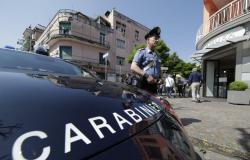Because in France we go to the vote
According to the normal political calendar, after the European elections on June 9, the next elections in France were the 2026 municipal elections. But following the victory of the leader of the Rassemblement National, Jordan Bardella, and the defeat of the leader of the Macronist list Valérie Hayer, closely followed by the socialist revelation Raphaël Glucksmann, President Emmanuel Macron has decided to dissolve the National Assembly and call early elections, to arrive at a “clarification” of the political situation. The French are therefore called to vote – on Sunday, July 30 and Sunday, July 7 – in advance to elect the 577 deputies, who will remain in office until 2029, for a five-year term, unless the National Assembly is dissolved again before then.
When to vote: dates and times
French citizens residing abroad were able to vote via the Internet from 12pm on Tuesday 25 June to 12pm on Thursday 27 June (Paris time). Voters from several French overseas departments and territories will vote Saturday 29 June: this is the case of Guadeloupe, French Guiana, Martinique, French Polynesia, Saint-Barthélemy, Saint-Pierre-et-Miquelon and voters resident in the American continent and the Caribbean. French citizens resident in France, foreign voters and those from Reunion, Mayotte, New Caledonia and Wallis and Futuna are called to vote Sunday, June 30th.
Why did the president call the elections so early, just three weeks before the European elections? Macron wanted to involve the French before they went on vacation and before the Paris Olympics, which open on July 26.
Voters will be able to go to vote from 8 am to 6 pm as a general rule, but until 8 pm in large cities.
The seats of the National Assembly
The legislative elections of June 30 and July 7, 2024 will renew the entire National Assembly. The French Constitution establishes a 577 the maximum number of deputiesThe 577 seats are divided into 558 for the departments, 8 for New Caledonia and the overseas collectivities and 11 for French citizens living abroad.
Voters are French citizens aged 18 or over who enjoy full civil and political rights and are registered on the electoral rolls. According to INSEE (the French National Institute of Statistics), over 49 million people are registered to vote.
The electoral system
Deputies are elected with a two-round majoritarian system. To be elected in the first round, an absolute majority of votes cast and a number of votes equal to a quarter of registered voters are required. In the second round, a relative majority is sufficient. In the event of a tie, the eldest candidate is elected. To be eligible to stand in the second round, a candidate must have obtained in the first round a number of votes equal to at least 12.5% of the number of registered voters in the constituency.
The three political blocs and the candidates
The president of the right-wing Gaullist party The RepublicansEric Ciotti, has proposed an alliance with the Rassemblement National, but the party leadership is opposed to this agreement and is calling for Eric Ciotti’s ouster, which has so far been denied by justice. The party also Reconquest Eric Zemmour has tried to forge closer ties with the RN, but the Lepenist party has refused any alliance. Eric Zemmour has announced only 330 candidates in 577 constituencies. Marion Maréchal, who left her aunt Marine Le Pen’s Rassemblement National to join Zemmour in the 2022 presidential election, has returned to the RN.
After several days of discussions, the four left-wing forces reached an agreement to form a New Popular Front which presents a single candidate in the 577 constituencies in the first round. Under this agreement, France Unbowed will present 229 candidates, the Socialist Party will have 175, ecologists will have 92 and communists 50.
At the center, President Emmanuel Macron has entrusted the leadership of the coalition’s campaign «Ensemble» to Prime Minister Gabriel Attal, and both have tried to position the Macronist central bloc as “the camp of reason” opposed to the “extremes”, that is, the right and the left.
I programs
There was no time for a real program-based election campaign and some measures were announced and then withdrawn, but five main measures can be identified for each of the three blocs.
- National gathering (Bardella): pension at 60 for those who started before the age of 20, increase in wages, ban on mobile phones in schools, double European and French border, expulsion of foreigners in an irregular position especially if they are perpetrators of crimes.
- New Popular Front (Mélenchon and Glucksmann): repeal of pension reform, minimum wage from the current 1400 to 1600 euros net, wealth tax, 100% free education, recognition of the State of Palestine.
- Ensemble (Attal e Macron): inflation-linked pensions, wage increases, four-day working week, more doctors especially in rural areas, proportional electoral reform.
The latest polls
The Rassemblement National and its allies led by Éric Ciotti I’m largely in the lead as for voting intentions for the first round on Sunday 30 June, according to all polling institutes, which give them around 36%.
The left-wing bloc Nouveau Front Populaire (NFP) is in second place, around 28-29%. The presidential majority, grouped in the coalition Ensemble pour la République, is given around 20% and could be the big loser of the vote.
It is difficult to translate these percentages into forecasts of seats in the National Assembly after the second round on July 7. The main uncertainty concerns the fact whether the Rassemblement national will be able to reach the threshold of 289 seats which constitute the absolute majority, in which case Jordan Bardella would accept the position of prime minister, due to an unprecedented cohabitation of the far right in Matignon with the centrist Emmanuel Macron at the Elysée. In the last few days the Rassemblement national is seen to be growing and an absolute majority cannot be excluded. The importance of these elections is such that the mobilization of these days suggests a very high turnout.
Macron’s fate
President Emmanuel Macron reiterates that, whatever the outcome of the vote on June 20 and July 7, will remain at the Elysée until its natural expiry of his mandate, that is until 2027 when new presidential elections are scheduled in which he will not be able to run (the French Constitution provides for a limit of two mandates and he has already won the 2017 and 2022 elections). But many feed strong doubts about his political stabilityespecially if the Rassemblement National obtains an absolute majority of seats and Jordan Bardella becomes prime minister. But even if this does not happen, Macron’s political situation becomes very difficult. It is unlikely that the left will obtain an absolute majority, and it is almost impossible that the Macronist center will succeed, at least in its current form. It is therefore possible that a situation of parliamentary blockade, with political chaos which would be the paradoxical effect of the “clarification” sought by Macron by organizing early elections so hastily. Many observers think that, despite his statements, Macron could be forced to resign before 2027.




